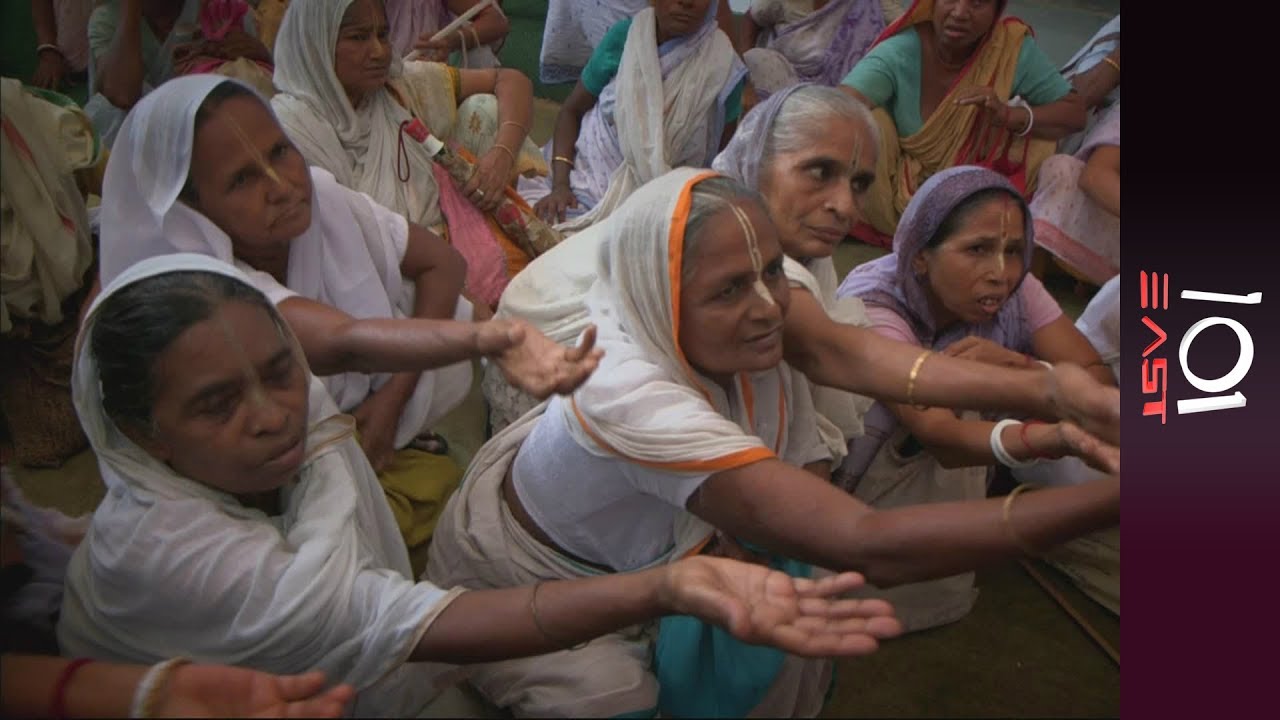🇮🇳 India | A Widow’s Penance | 101 East
India: A Widow’s Penance
The holy city of Vrindavan in India is known as a popular Hindu pilgrimage centre but it is also known as the ‘city of widows’, with an estimated 20,000 calling it home.
The ancient Hindu tradition of widows throwing themselves on their husband’s funeral pyre to join his soul in death was banned by the British in 1829. Yet the long-held belief that a widow’s fate is intertwined with that of her husband continues in many parts of India today. Many are shunned by their family and are seen as a financial drain.
Ostracised by society, many widows travel to Vrindavan for a life of devotion and dignity. Many survive by begging on the streets, sleeping in government run care homes, shabby rented accommodation or on the streets.
They are expected to live an austere life and to renounce worldly pleasures. They leave behind their colourful saris, part with their jewellery, and shave their heads. Many are often escorted by their relatives to Vrindavan, who leave them in the city with no intention of ever taking them back. Others arrive willingly and return to visit their homes a few times in a year.
In this city of more than 4,000 temples, no one goes to bed hungry. Locals and visiting pilgrims offer food and money to the widows to gain spiritual merit. The widows can also earn 15 cents a day and a hot meal by singing religious hymns and chants at the local ashrams.
But in death, as in life, the widows are treated with disregard.
Last year, a huge media stir was caused when a local Indian television channel reported on how the bodies of Vrindavan’s widows were being disposed. The report revealed authorities were chopping the bodies into pieces and putting them in gunny bags to throw into the river – claiming a lack of money for proper cremation.
101 East explores the daily battles of India’s abandoned widows as they face restrictions on inheritance, remarriage and social welfare.
We meet one widow, Geeta, who was cast out from her family in West Bengal. She now lives in a government-run shelter after leaving her home where she says she was beaten and abused. We travel to her village, three hours away from the capital city Calcutta and meet her family to hear their side of the story.
We also meet individuals and NGOs who are unafraid to break social taboos, working to help empower widows across Vrindavan. Dr Bindeshwar Pathak, the founder of Sulabh International, has adopted seven shelters and government homes in Vrindavan, providing the widows with a monthly stipend of $35, seven times more than the government pension.
Lastly, we speak to Mamata Sharma of the National Commission for Women to explore how India plans to tackle the growing population of its widows which stands at 40 million.
101 East investigates the plight of India’s widows and modern India’s fight to restore honour and dignity to their lives.
We explore the daily battles of India’s widows as they face restrictions on inheritance, remarriage and social welfare.
More from 101 East on:
YouTube – http://aje.io/101eastYouTube
Facebook – http://facebook.com/101east
Twitter – http://twitter.com/aj101east
Instagram – http://instagram.com/aj101east
Website – http://aljazeera.com/101east




![Private: [ID: fBgycpxLWOA] Youtube Automatic](https://nezha.pro/wp-content/uploads/2023/09/private-id-fbgycpxlwoa-youtube-a-236x133.jpg)
![Private: [ID: 5pjnizqXy-g] Youtube Automatic](https://nezha.pro/wp-content/uploads/2023/08/private-id-5pjnizqxy-g-youtube-a-236x133.jpg)
![私密內容: [ID: EKY1OChHTa0] Youtube Automatic](https://nezha.pro/wp-content/uploads/2023/08/id-eky1ochhta0-youtube-automati-236x133.jpg)
![私密內容: [ID: 4UFe4tRMZ0Y] Youtube Automatic](https://nezha.pro/wp-content/uploads/2023/08/id-4ufe4trmz0y-youtube-automati-236x133.jpg)
![私密內容: [ID: pkl8HVDagHo] Youtube Automatic](https://nezha.pro/wp-content/uploads/2023/08/id-pkl8hvdagho-youtube-automati-236x133.jpg)
![私密內容: [ID: 5daehHaqpeo] Youtube Automatic](https://nezha.pro/wp-content/uploads/2023/07/id-5daehhaqpeo-youtube-automati-236x133.jpg)
![私密內容: [ID: XxMUOi61Irs] Youtube Automatic](https://nezha.pro/wp-content/uploads/2023/07/id-xxmuoi61irs-youtube-automati-236x133.jpg)
![Private: [ID: uY5SX8c8kWI] Youtube Automatic](https://nezha.pro/wp-content/uploads/2023/10/private-id-uy5sx8c8kwi-youtube-a-236x133.jpg)
![私密內容: [ID: tobguo86Ju4] Youtube Automatic](https://nezha.pro/wp-content/uploads/2023/07/id-tobguo86ju4-youtube-automati-236x133.jpg)
![私密內容: [ID: 00P3TEP9Tx0] Youtube Automatic](https://nezha.pro/wp-content/uploads/2023/06/id-00p3tep9tx0-youtube-automati-236x133.jpg)